HI, READERS!
A lot of you I know. But I think I know even less of you, which was not necessarily the case before last Monday.
I wrote a piece last Monday on Gustavo Dudamel and his disappointing role in the Super Bowl halftime show that I quietly shared on my personal Facebook page. Suddenly, the right people shared it, and people shared it after that, and suddenly my view-count exploded, to the point where the Washington Post gave me a nod in a contrarian article. Some people even hate shared my piece, too![ref]As a creator of public content, you love seeing comments like: “WHO wrote this garbage” followed by a link to your blog. It means people care.[/ref] This was incredibly amusing and somewhat shocking considering my fairly low traffic beforehand.
Here is the previous paragraph in graph form:
Interestingly, some of my close friends that have followed my blog since those flat-line days have asked me if having a new audience will change the way I write. It got me thinking on a classic conundrum of how your content should or shouldn’t change as it is exposed to a wider and more diverse audience, especially if you, the content producer, want to sustain a venture.
It’s why you hear outcries of “I used to like them before they went mainstream” about pop bands who change their style when they make it big. For instance, the top liked YouTube comment on superstar pop band Maroon 5’s 2003 hit Sunday Morning is this:
As renowed philosopher TheHotFalafel implies, there is a significant temptation for content producers to change their product to appeal to a wider audience. Indeed, you see this dilemma in numerous board rooms of classical music organizations–do we play the surefire hits that we know will draw in audiences and make money, or do we stretch the envelope with new or innovative programming and potentially alienate some of our subscriber base?
In the blogosphere, there is a love/hate relationship with the listicle:
Hate because they dominate and over-saturate the written portion of the internet… but easy to crank out when you’re lacking for creative energy or short on time.
My main beef with them is that there are so many clickbait versions of list articles that actually substantive content feels like they have to use the list article format to compete.
I, perhaps naively, want to change this paradigm. But I always say you can’t knock it til you try it. So let me explain, in list form, why I will never write in list form again.
1. CLICKBAIT IS A MASSIVE SOCIETAL PROBLEM (really!)
To make my point, I require a primer of how the world has evolved over the centuries.[ref]Yep, never going viral with this–I guarantee 60% of readers have already clicked away at this point.[/ref]
For a large chunk of human history, the way people lived life was quite simple. Bob worked for X employer and received $Y for his services. Awesome! Bob was then free to spend his new money for whatever goods or services he desired. He would go into his local market, where he had a few vendors to choose from for his meat, fruit, cookware, clothing, etc. Those vendors attracted business by having the best quality of products. For instance, let’s say you own a fruit stand in a small town. You can’t expect to stay in business long if Charlene across the street sells better fruit than you and yours is rotten sometimes: word gets around fast in the small town that your fruit is subpar and Charlene’s is pretty good. Since your product is worse, your reputation is worse, and thus you make less money. By contrast, as time passes, Charlene’s better product grows her reputation, and she gains more attention, and thus gets more business. You, Mr./Ms. Incompetent Fruit Stand Owner, must improve your product or risk going out of business.
In other words, better product = more money. Often, that business translates into more money, which can be used to increase the quality of the product (better methods of storing fruit, better fruit, nicer shops for customers, etc.). The cycle repeats. I think of it as something like this:
And so life went on for many moons. But suddenly, the Industrial Revolution happened, and suddenly you had hundreds of times the amount of products being made with machines. Stores began to stock a massive amount of products, spawning the likes of Giant Retail (think Wal-Mart, Target). Before, a customer might have been able to try your fruit on one shopping trip and Charlene’s fruit on another. Suddenly, it became impractical to test each product option when you could choose from a gamut of 18 different peanut butters, 24 different shampoos, and 10 different laundry detergents.[ref]”Oh shit, this peanut butter is 75c more… but maybe the other one’s cheaper because the ingredients are shitty… DECISIONS!”[/ref]
Thus, the window opened for the fields of marketing and advertising! Companies now had to market to their consumers (either via the packaging or outside advertising) and explain why their product stood above the pack, often before their consumers even entered the store. Thus, the roles of attention and the product were reversed–in a world where choice is almost infinite, you had to get attention to your product before anyone could realize how great it was. That reality looks like this:
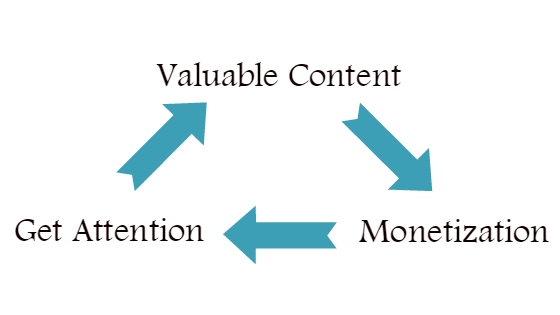
As more Content entered the marketplace, Attention needed to be brought to the Content before the Content could make Money.
Still with me? Because this is where the internet comes in and disrupts the hell out of everthing.[ref]For a more in-depth write-up about this, check out Mark Manson’s changed-my-life article on the attention economy.[/ref]
The first major person to unlock the new possibilities in the age of the Internet was tabloid wizard Perez Hilton. Perez, for his reputation now, was a genius–he realized that to make the most amount of money, the chief point of interest was that users keep coming, over and over, to your website. It didn’t matter why–the content didn’t have to be good, just addicting.
So he threw juicy celeb oriented headlines like today’s:
Ow, Ow! Taylor Swift Brings Abs & Undies To The Grammys Red Carpet
(ugh, I felt dirty just linking that)
and his success took off:
During an interview in Cliché Magazine (June/July 2010), Hilton said that he only started blogging as a hobby. “What set my site apart is that prior to PerezHilton.com, most blogs were mainly online journals and diaries, but that never interested me. I wanted to talk about celebrities because they’re far more entertaining.”[23] On March 11, 2005, within the first six months of Hilton’s blogging career, PageSixSixSix.com was named “Hollywood’s Most-Hated Website” by The Insider, catalyzing an initial surge in its popularity which temporarily crippled its server.
And thus began this era:
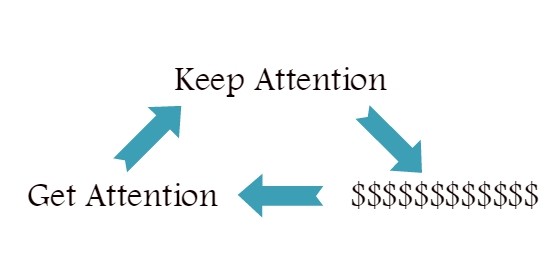
Now, as long as companies can get and keep your attention, they don’t even have to produce quality content anymore. Just look at CNN!
Perez leveraged his blog’s wild success to numerous TV appearances, book deal, and nationally syndicated radio show. He’s pretty successful, at least in the financial success of the world.
But does he make the world a better place? Does a world full of content geared solely towards keeping your attention make for a better population? Do I want to be one of those people just to get page views?
2. CLICKBAIT DOESN’T MAKE CLASSICAL MUSIC BETTER

Should our battle as classical musicians really be to occupy one of those screens? Or should we fight to at least be the only screen?
If we try to compete with other attention-keeping content, we’re doomed to lose. Proper enjoyment of classical music requires attention by nature: A recapitulation in a Beethoven sonata is not nearly as riveting, moving, or gratifying if you were texting during the exposition. Listening to classical music used to be an attention-intensive activity by nature–not only were most opportunities to listen to classical music only located inside the concert hall, but humans also did not have devices vibrating in our pockets reminding us of the obligations, temptations, and notifications of the outside world.
As others have pointed out, list articles are good for skimming–their inherent “value” lies in the lack of investment required to be entertained. Unlike traditional articles, you can skip content without jeopardizing your understanding of the rest of the content. Just click on me! You’ll laugh or cry a little bit for four minutes, and you’ll be right back to whatever productive thing you’re supposed to be doing. Oh, you finished? Well, if you’ve got another minute or two, here’s another great list article on Emma Watson… And as I have argued before, classical music’s inherent value is antithetical to brevity. Classical music rewards attention, and in today’s scatterbrained, multitask-heavy society, music gives attention as a gift.
When we reduce even valuable classical music content to a form that requires skimming, we imply, albeit loosely, something deeply wrong–that classical music can be enjoyed passively.
There is a contrarian argument to be made: that fast and cheap have revolutionized the world for the better. Information is more easily accessible, calorically dense food can be ordered, paid for, and consumed in a 10 minute span, and setting up a date with a random stranger is as easy as swiping and typing with your thumbs. Maybe the same could be said for pop music–that all of the emotional and neurological benefits of musical listening have been condensed in an efficient way. But I’m not so sure. The Internet is changing our brains. Yes, our productivity has increased. But our attention spans have plummeted. Our relationships have suffered. Our waistlines have increased.
I want my content, like classical music, to be an oasis from distraction, not another grain of sand in the desert.
3. LIST ARTICLES DON’T MAKE ME FEEL GOOD
Look, I read list articles all the time. I’ve read quite a range, from useful ones like The Six Lists You Need To Make Every Day Productive to nostalgia-bait ones like 17 Incredibly Weird Things You Used To Do When You Had A School Crush. I also have a compulsive WingStop habit; on Mondays I usually go home and eat boneless wings since they’re 50% off and delicious. It’s a (not positive) way I cope with my day; my Mondays can be brutal. But I never leave feeling like I have done a good thing for my body.
Content’s ability to generate a lot of attention (i.e. views) doesn’t mean it is inherently valuable. Similarly, a lack of attention to content does not indicate a lack of value. I intend to take the same approach with my blog that I advocate classical music take: attract attention to the product without compromising its value. Valuable content can be packaged in attention grabbing ways. John Oliver’s Last Week Tonight strikes me as the strongest example–John Oliver has used an attention grabbing format of a comedy show to bring otherwise dull, generally bipartisan issues like the penny, FIFA corruption, and Televangelism fraud to light, and has brought about real change.
Maybe you and I don’t share these feelings on list articles. Maybe you’ve read a list article that’s changed your life, or intellectually enriched you. That’s awesome! There are certainly good ones out there. But the thing is, I haven’t. Even with good ones, none of them have made me smarter or more funny. I end up only with a vague sense that I could have used my time in a better way. So I don’t want to impart that feeling on my readers, even if it means I have less of them as a result.
I don’t denigrate any of the writers at BuzzFeed or EliteDaily–hell, I know one[ref]Thanks, Dun-Well Doughnuts, for your surprise networking potential![/ref]–and their knack for brevity in their writing is definitely a skill I continue to cultivate. I get that in many ways, the list article is its own art–it deserves respect much like a top 40 hit. I also realize that we have to pay rent somehow, and I also am not trying to set myself up as some white knight eschewing the viral for the virtuous. All I’m saying is that writing long-form has a certain therapeutic effect for me. Writing a hefty article requires an immersion into the task at hand; if I write distractedly, my thoughts sound scattered and unconnected, and I don’t connect to the reader as a result.
I believe that our attention should go to the things in life that are valuable. Writing fluff content designed only to get as many eyeballs as possible runs directly counter to that belief. I could probably get successful doing that. But I wouldn’t feel good about it afterwards. It’d be like eating 20 boneless Mango Habanero wings and a full plate of fries by myself, which I have definitely never done before in my life. Why are you looking at me funny?
…
Reader, I have a lot of ambitions.[ref]One, as stated in my bio, is to write a New York Times bestseller.[/ref] I may not know what the hell I’m doing at this very moment, but I do know that long term, I want to move the needle for the arts on a large scale. It’s too important a task for me not to at least try. My blog may or may not succeed as one of the catalysts for that goal, but its success will not be caused by cheap, psychologically addicting content, at least, not anymore.
I’ll leave BuzzFeed to interview Lindsey Stirling for that.
Thanks for reading. Come back for new content next Monday, every Monday. No clickbait, no fluff, just value. Thoughts? Leave a comment below, or send me an email. I respond to everyone.
If you liked what you read, please consider sharing my content on Facebook, Twitter, or email it to a friend. If we’re lucky, someone from BuzzFeed will include me in a “9 Bloggers With The Most Unbelievably Pretentious Viewpoints” list article!


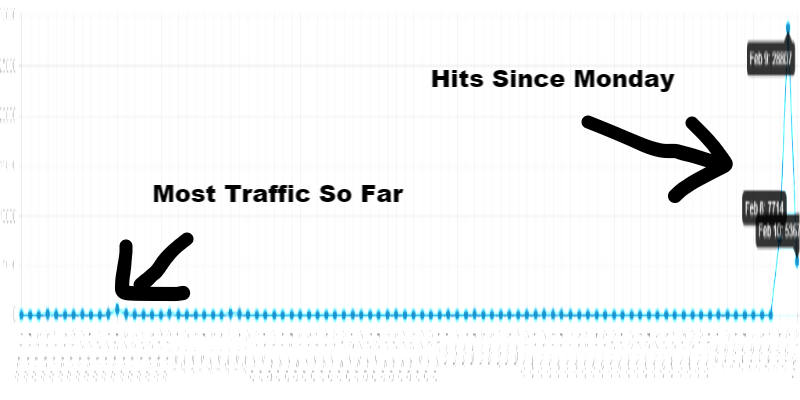

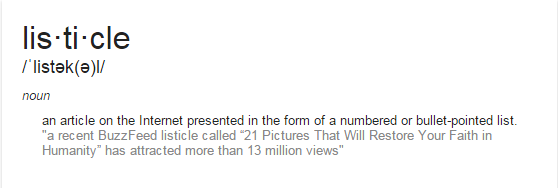
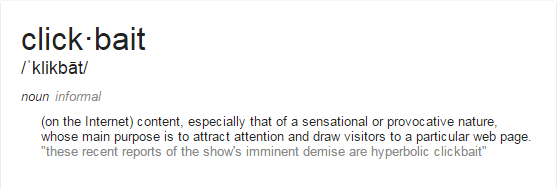
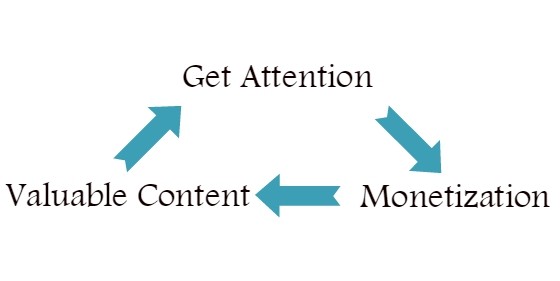
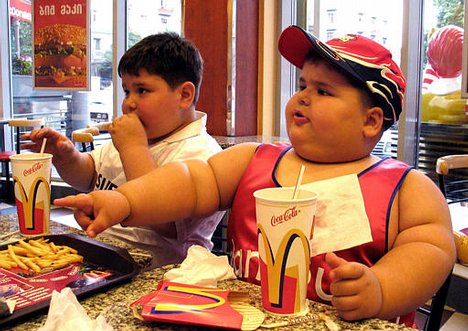
Great points and great comparison of listicles to fast food. I think it’s okay to get information quickly and easily but there is merit in a tradition long form post with quality writing. I notice when I write listicles they tend to get more traffic–easy for people to absorb, and to read at our boring desk jobs. Most of us have boring desk jobs. :/ (not all of us get to be professional musicians!)
Excellent thoughts. Agree completely. Maybe one day I’ll sit down and write my own!